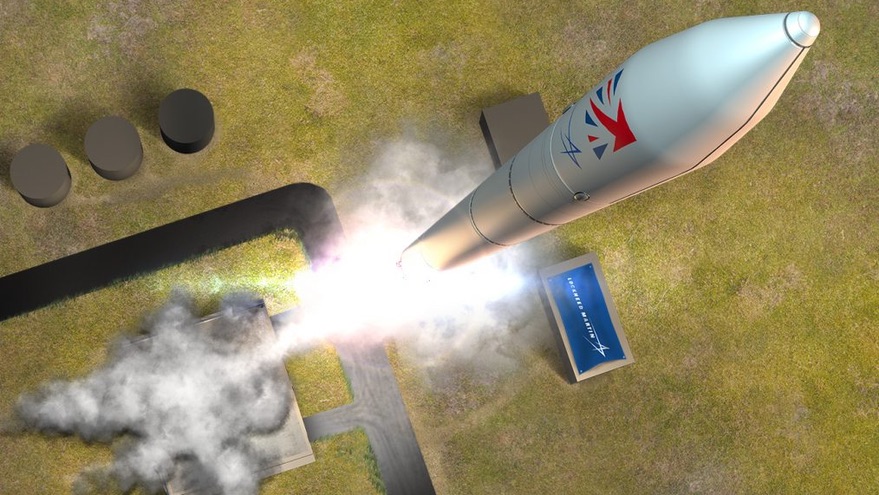Products You May Like
WASHINGTON — More than two years after Lockheed Martin announced it would be one of the first customers of a proposed spaceport in Scotland, the company has decided to move to another proposed spaceport there.
The U.K. Space Agency announced Oct. 22 that it backed a proposal by the company to shift its planned U.K. Pathfinder Launch mission from Space Hub Sutherland in northern Scotland to the Shetland Space Centre on the island of Unst in the Shetland Islands. The agency said in a statement that doing so “would continue to deliver long-term value and help establish a sustainable, commercial launch market as part of the UK’s spaceflight program.”
The U.K. Space Agency announced in July 2018 that Lockheed Martin and Orbex, a small launch vehicle startup, would be the first customers of the Sutherland spaceport, whose development the agency announced at the same time. Orbex received $7 million and Lockheed Martin $31 million, part of which went toward development of an upper stage called the Small Launch Orbital Maneuvering Vehicle that it would build in the U.K.
The announcement did not explain why Lockheed Martin sought to move from one proposed launch site to another. Liz Crawshaw, a spokesperson for Lockheed Martin’s U.K. operations, said conflicting requirements between Lockheed Martin and Orbex led to the decision.
“As the plans for Space Hub Sutherland took shape, it became clear that Orbex and Lockheed Martin had very different technical requirements and that separate launch sites would offer a more attractive solution at this time and maximize the potential success of both endeavors,” she said. She did not elaborate on those differing requirements.
Orbex is developing a small launch vehicle called Prime that is designed to place 150 kilograms into a 500-kilometer sun-synchronous orbit. The rocket makes extensive use of additive manufacturing technologies, and is powered by liquid oxygen and “bio-propane,” a version of propane fuel made from biomass that has a lower carbon footprint than kerosene.
Lockheed Martin, by contrast, has not disclosed which vehicle it will use for its launch from Scotland. The company does not have its own small launcher, but at the July 2018 announcement speculation focused on Rocket Lab and its Electron small launcher because Lockheed Martin is an investor in the company. Lockheed, though, has also invested in ABL Space Systems, another small launch vehicle developer.
In the announcement about the shift to the Shetland Space Centre, Lockheed said it was “in discussions with a preferred partner to provide launch services,” but did not disclose the partner. Crawshaw said the company would announce that partner in the next few months, with that launch planned for the early 2020s.
Government officials argued that the decision would help broaden the support for the launch industry in the U.K. as well as the overall space industry. “The transfer of Lockheed Martin’s U.K. pathfinder satellite launch to Shetland Space Centre will enhance Scotland’s existing vertical launch capability and enable us to target a wider market base through a complementary offer across multiple spaceports,” said Ivan McKee, minister for trade, investment and innovation in the Scottish government.
“Having complementary vertical launch sites in Scotland will also maximize the U.K.’s potential to be first to market in Northern Europe and ensure the economic benefits are shared across the Highlands and Islands region as well as the wider U.K.,” Crawshaw said.
Whether there is sufficient demand to support two launch sites, or even one, is less certain. Shetland Space Centre announced in June that C6 Launch Systems, a Canadian small launch vehicle developer, plans to launch from the site. That company is still working on its launch vehicle, and recently announced it would conduct engine tests at Spaceport America in New Mexico in the next several months.
The two spaceports are still in their planning phases. Highlands and Islands Enterprise, the development agency leading Space Hub Sutherland, has been working to secure various government approvals for the site, most recently submitting an application to the Scottish Land Court. Shetland Space Centre held an online public consultation for the spaceport in mid-October as it prepares to submit a proposal to the Shetland Islands Council.
In addition to the two vertical launch sites in Scotland, Cornwall Airport Newquay in England is seeking to host launches by Virgin Orbit’s LauncherOne air-launch system under the name Spaceport Cornwall. Spaceport officials said in June they expect launches there to begin by early 2022.
